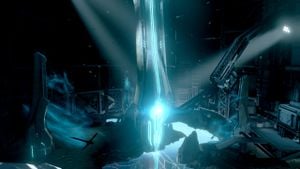

- "The Composer! So many possibilities and capabilities tied up in that strange name... A Composer of minds and souls!"
- — Forthencho, Lord of Admirals[1]
The Composer was an ancient Forerunner machine capable of converting living beings into digital forms.[2]
Overview and function
Although the Forerunners possessed other technology capable of extracting an individual's memories and partial personality impressions,[3] the Composer was designed as a means to achieve true immortality in digital form, allowing the Forerunners to transcend their biological forms altogether. As the Flood only assimilated biological matter, digitally stored intelligences would have remained immune to the parasite. Physically an enormous monolith engraved with patterns of lines characteristic of Forerunner architecture, the Composer was a highly complex machine with a great deal of capabilities. It appears that the Composer's effects varied based on the skill of the individual utilizing it, namely their understanding of its workings.[4][1]
According to the Librarian, the Forerunners never perfectly mastered the use of the Composer and the resulting digital personalities became corrupted or fragmented and could no longer be restored to biological form. She stated that the Forerunner originally abandoned the device for this reason.[5] However, there are several instances of Composer-processed minds retaining their individual personalities and memories with only mild degrees of instability or decay. The Librarian herself implanted stored personalities originally extracted by the Composer into the genetic code of other living beings, with said personalities achieving self-awareness and retaining their original identity within their new human hosts, such as Chakas and Riser.[note 1] The Composer could also be used to remove these stored personalities, although this did grave physical and mental damage to the individual carrying the imprint.[4]
Even the physical effects of the Composer on its targets were varied; when the Didact fired the Composer directly on humans, the device projected a beam of orange light which completely reduced the targets to ash in a rather gruesome manner while their minds were digitized. Aside from this direct form of scanning, the Composer was also capable of a less violent method of extraction. When the Librarian and her Lifeworkers used the Composer indirectly via intermediary devices, the bodies of the targeted individuals were not destroyed and instead the scan caused them to peacefully expire as their consciousnesses were removed from their bodies.[6]
Minds scanned by the Composer could be processed in a variety of ways. Although the ancient human personalities extracted and stored by the Librarian retained in their original personalities, in some cases the digitized neural map could be used as the basis for artificial intelligence constructs in a manner similar to the creation of human smart AIs. These intelligences would contain many of their original memories and sometimes even portions of their personality, but would otherwise behave within the limits of the duties assigned to them. For example, the Promethean Knights behave in a largely uniform manner despite containing many of the memories of the individuals they were created from.[7] These intelligences appear to be susceptible to a condition comparable to the rampancy exhibited by human smart AIs. However, these symptoms appear over a much longer period of time, as evidenced by 343 Guilty Spark, a monitor created from a human mind processed by the Composer. Guilty Spark showed occasional signs of instability and his personality suffered fragmentation, but he remained operational and capable of performing his assigned tasks for over 100,000 years.[8]
The Composer did not work on all organic beings; certain individuals could, through genetic manipulation, become immune to its effects. After undergoing mutation in an attempt to gain immunity to the Flood, the Didact's physiology was no longer compatible with the Composer.[9] Similarly, the geas the Librarian placed on humanity allowed the Spartan John-117 to develop a resistance to the Composer; this ability had to be activated, and thus it did not automatically protect all humans from the device.[5]
The Composer was also capable of slowing down Flood infection and the subsequent loss of individuality; however, this process was only temporary and still left the afflicted individuals in their deformed state. This was accomplished through wrapping the infected bodies in a form of supportive harness flowing with energy, evidently somehow connected to the Composer.[10]
History
The first known use of the Composer was when the Librarian employed its primary capability by extracting the memories of the surviving human warriors after the Charum Hakkor campaign in order to preserve these personalities in future generations of humans and to study the stored memories in hopes of discovering how humanity managed to defeat the Flood. The Lord of Admirals, supreme commander of all human forces and one of the humans to have their minds harvested, described the effects of the Composer as "strange, ever-changing" and "multiformed", as it operated via intermediary Lifeworker machinery.[6]
As a result of the risks and irregularities involved with its usage, the Forerunners eventually abandoned the Composer and its existence was made a closely guarded secret known only to few.[11] Even its actual nature remained obscure; whether it was a machine or being remained uncertain to most. Some even believed the Composer to be a "product of its own services"; a Forerunner, perhaps a Lifeworker, suspended in the final stages of Flood infection.[12][13]
Around 100,000 BCE, the Composer was used by the Master Builder to stave off Flood infection in certain Forerunners on Installation 07 to keep them in a docile state. While in control of Installation 07, Mendicant Bias and the Primordial also used the Composer to extract the ancestral memory imprints from Chakas and the other humans from Earth.[4] Later during the Forerunner-Flood war, the Didact used the Composer to convert his Promethean warriors into robotic form in order to allow them to combat the Flood more efficiently and without risk of infection. To bolster his numbers, the Didact used the Composer on a number of humans transplanted to a Halo installation, turning them into additional forces in his mechanized army.[9]
The Composer was later placed on Installation 03. In late 2554,[14] the UNSC Office of Naval Intelligence discovered the machine on the Halo ring and transported it to Ivanoff Station, a research facility in the asteroid field in Installation 03's orbit. Some of the scientists were digitized by the Composer while studying it and the sensor data from the incident contained coordinates that led the UNSC Infinity to Requiem.[15] Upon awakening on Requiem in July 2557, the Didact immediately headed for the Composer and successfully acquired the device after launching an attack on Ivanoff Station. Planning to use the Composer to neutralize all of mankind by forever imprisoning them into digital form, he first used it on the human personnel of Ivanoff; John-117 was the only survivor as a result of genetic modifications imbued by the Librarian. The Didact then set course for Earth in order to realize the final stage of his plan. The Didact successfully fired the Composer on an URNA metropolis, New Phoenix, but the effect was halted when John-117 destroyed the Didact's ship, and the Composer along with it, with a HAVOK tactical nuclear weapon.[2] Some of the resulting digital intelligences survived, having ended up in Requiem via a slipspace transit portal connected to the Composer.[7]
Gallery
Concept art of one of the shield generators around the Composer on the level Midnight.
List of appearances
- Halo: Primordium (First appearance)
- Halo 4
Notes
- ^ It is likely that the Librarian was exaggerating as to the negative aspects of the Composer in order to convince John-117 of the threat it posed at the hands of the Didact. In any case, she greatly simplifies the events that actually occurred, only stating that the Didact used the Composer on humans to create his Promethean constructs as punishment for humanity's defiance of the Forerunners; she omits the fact that she used the Composer herself on ancient humans and regularly implanted the resulting personalities in many future generations of humans. Likewise, she does not mention that the original Knights were actually created from voluntary Promethean warriors. This is well in line with her characterization as a benevolent, yet devious figure.
Sources
- ^ a b Halo: Primordium, page 232-233
- ^ a b Halo 4
- ^ Halo: Cryptum, pages 47-48, 138
- ^ a b c Halo: Primordium, page 355
- ^ a b Halo 4, campaign level Reclaimer
- ^ a b Halo: Primordium, page 235
- ^ a b Spartan Ops, S1E5 Memento Mori
- ^ Halo: Combat Evolved Anniversary, Terminals
- ^ a b Halo 4, Terminals
- ^ Halo: Primordium, page 322-323
- ^ Halo: Primordium, page 271-272
- ^ Halo: Primordium, page 268
- ^ Halo: Primordium, page 278
- ^ Halo 4, campaign level Composer, Audio log
- ^ Halo 4, campaign level Infinity
| ||||||||
